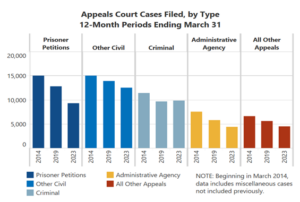
Carole Levine October 14, 2024
November 5th is less than three weeks away and everyone I know seems nervous and on edge. Discussions about this election too often make me feel like I am walking on eggshells. I worry that my opinions may trigger something that will impact long-standing relationships and friendships. As someone who does not often hesitate to state my positions, I find myself hesitating and reluctant to speak out.
This is not normal.
These times are not normal.
But there is one subject that I feel I must speak out about… voting for judges.
I have worked for over 20 years (maybe more) on this issue that is not talked about often enough — the election and appointment of judges. Federal judges are nominated by the President and vetted and then voted on by the US Senate. State judicial slots are filled in different ways in different states – some are appointed by the Governor; some are elected in partisan elections; some are voted on, once seated, in nonpartisan retention elections; and there are other variations. But no matter where you live, it is likely that you will have judges on your November ballot.
Each state operates differently in how judges in their state court systems are put on the bench, but there is one area of this system that crosses all state lines. The appointment of judges to the federal courts (both district and appellate) all come through the U.S. Senate. When you are voting for your Senator, you are also voting for someone who will determine the makeup of the federal judiciary. In essence, if you care about our judicial system, you need to care about who is elected to the Senate.
Because the President nominates all federal judicial candidates (including Supreme Court nominees, I am worried about the Presidential race as well. The Senate votes on those nominees (at least the ones that pass muster with the Senate Judiciary Committee) and they then have lifetime tenure on the courts. This is not just Supreme Court nominees, but all federal judicial nominees. Those that are approved in the Senate will be making decisions about critical issues from the quality of the water we drink and the air we breathe, to who we can marry, what we can read, what our health care options are and more. This makes the reality of who fills the Presidency and the Senate so important. In the 2023-24 term, The Supreme Court heard 60 cases, with 2 additional cases dismissed from the docket. The average number of cases heard per year is 74.3. The Supreme CourtI receives an average of 7,000 to 8,000 petitions for hearings each year. What happens to those cases that are rejected by the Supreme Court? The rulings in the lower federal courts (where most of these petitions come from) then stand. Those lower court, federal judges are also making law and setting boundaries to the tune of approximately 400,000 cases per year.
Here’s a look at the kinds of federal appeals cases that are filed. Once appealed in this level court, the next recourse for further appeal is the US Supreme Court. As I noted above, the chances of acceptance for appeal at that level is limited. It should be noted that the numbers of appeals cases are decreasing:

Now let’s turn to the judges whose names will be directly on your ballot. These are the people who will serve on the various levels of state and local courts.While they do not have lifetime tenure on the courts, these judges can and do make decisions about many aspects of our lives. There are approximately 30,000 state judges, compared to only 1,700 federal judges. These state judges will preside over as many as 100 million cases across the country. When it comes to who we elect or retain in our courts at this level, it can be as significant as who we elect to the Presidency or the US Senate in terms of our everyday lives.
Being informed as we vote on the judicial candidates that are on our November ballots is important. Resources and information is available, but often not so simple to find. Many local and state bar associations evaluate the records of judicial candidates and offer their ratings. So do a number of local organizations. Finding this information can help in making wise choices for who will sit in judgement in your state, county or city. If you Google “rating judicial candidates” you should get information about groups and organizations that do this work. In Illinois, I chair a statewide organization called Courts Matter Illinois. We have put together a listing of many of the organizations that rate judges in Illinois. Here’s a link (it gets updated as new ratings are available: https://files.constantcontact.com/c4d7c363701/d448d4db-9a7f-4bbc-b40a-4c7a66e3bd95.pdf?rdr=true
No matter where you stand on the many issues on November 5th, your vote will be shaping the judicial direction of our nation. So become informed and know that from the Presidency to our Senate, to our state level judicial candidates, your vote matters. At each of these levels you are making a statement about major issues, including our voting rights. You can help make our systems of justice truly just.
Albert Einstein wisely pointed out “Not everything that counts can be counted, and not everything that can be counted counts.” Your votes will count. Be sure to vote down ballot and vote for judges.
